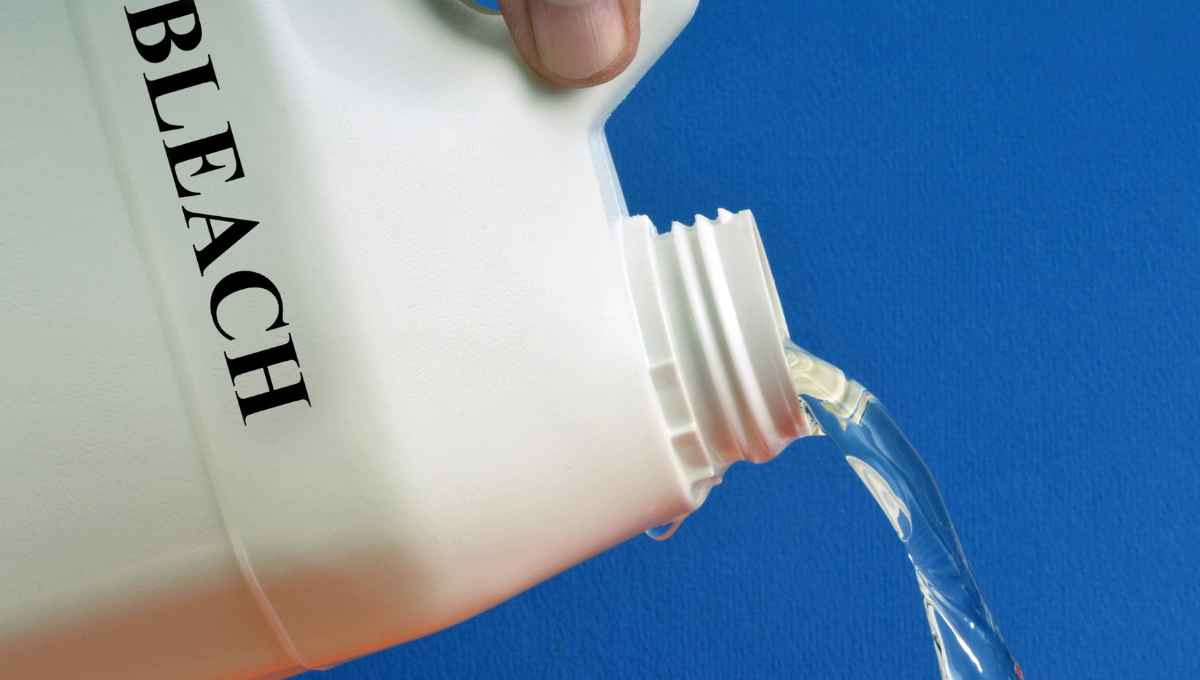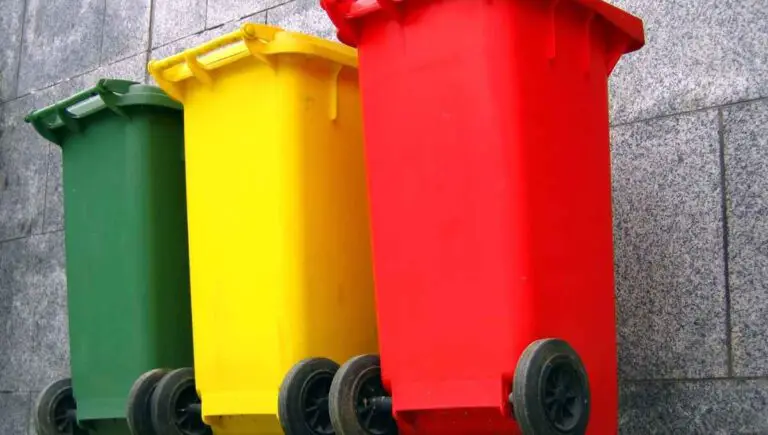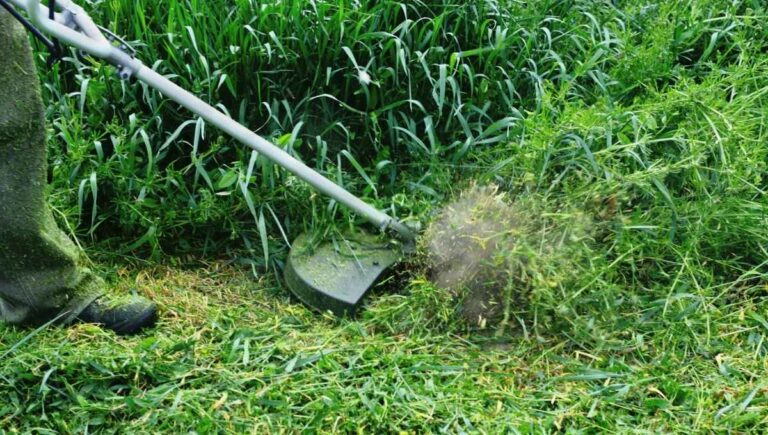Can I Pour Bleach in My Trash Can? (Cleaning It Properly)

You may be wondering if you can use bleach to clean your trash can, especially if it’s become dirty and smelly over time. While bleach is a powerful cleaning agent, it’s important to use it safely and correctly.
Pouring bleach in your trash can will help kill germs and bacteria, but it’s important to use it safely and correctly. You should dilute the bleach with water and avoid mixing it with other cleaning chemicals. Overuse of straight bleach can harm the trash can, and inhaling the fumes can be dangerous.
Of course, there are other options if you don’t want to go through the hassle of trying to dilute bleach properly for safe use. So, let’s talk about how to get your trash cans clean, how to stop them from smelling bad, and more!
This post contains affiliate links from Amazon and other stores. This means Yard Blogger may earn a commission if you make a purchase using any of our links. Please refer to our full affiliate disclosure policy for full details.
Here’s a Quick Pro Tip!
So, we’ve put together a must-have list of items for the next time you’re going to be doing a deep clean of your trash cans:
1. Bleach – While there are other alternatives, using bleach is a fast way to kill mold, insect larvae, and the bad smells emanating from your trash can.
2. Dish Soap – Before you bleach, make sure you’re removing all visible residue!
3. Scrub Brush – Use along with dish soap to ensure all the small spaces of your trash can get thoroughly cleaned!
Let’s Talk about Bacteria and Trash Cans
Just because these cans are where we put our refuse doesn’t mean they have to be disgusting. Though garbage cans can carry bacteria, you can easily solve that by sanitizing your trash cans at least once a week.
Sanitizing your trash cans is actually a two-part process because cleaning and sanitizing are two different things. You first want to clean out any visible debris; second is to get rid of germs and bacteria.
Bacteria can build up in your trash can over time, including E. Coli, Listeria, Salmonella, and more. These bacteria can build up when you throw away eggs, raw meat (and its packaging), or any other contaminated food.
A build-up of organic materials in your garbage can also lead to mold issues. Mold spores can end up almost anywhere, and all it needs to grow is moisture and food, both of which they can get from the trash.
The Proper Way to Clean Out Your Cans
Once your trash has been collected, before you bring the cans back inside (add a hyperlink to the garage trash article here?), simply clean them to prevent odors and kill bacteria. First, use dish soap and water to pre-clean the cans, using your hose to spray them out. Then sanitize them. You can do this by using a sanitizing spray or by diluting bleach with water and scrubbing out the can.
If you use bleach, make sure you dilute it properly. Your bleach should have dilution ratios right on the side, so follow their written instructions. Fill the can at least ¾ full with hot water, then add the recommended amount of bleach. Allow that to sit for at least 30 minutes.
Then, remove the water carefully! Never pour water with bleach or other chemicals into storm drains, as it can contaminate freshwater sources. However, this is safe to pour on your lawn, as the bleach is diluted.
Finally, allow your trash can to air dry in the sun before refilling it with trash. To keep your cans cleaner, always use a high-quality garbage bag to minimize the amount of debris that gets into your can.
One other important note never mix other chemical cleaners with bleach. If you mix the wrong chemicals, you can end up with chlorine gas, which is hazardous and can be deadly in close spaces. Always perform your cleaning outside in the open air, and don’t mix chemicals.
Killing the Smell
Did you know that the bacteria in your trash can is causing a bad smell? This is because when organic matter starts rotting, microorganisms start feasting on the decomposition, releasing chemicals that cause bad smells.
So, cleaning out the cans and keeping trash contained are the two easiest ways to keep your outside trash can from smelling. Start by properly bagging your trash, so the cans don’t get compromised with food particles.
Is It Your Can Causing the Smell?
Plastic trash cans, in particular, are susceptible to odors. This is because plastic is porous enough that microbes can get entrenched in the cans, and once they’ve settled in when they eat on decomposing trash, the smell worsens.
Hence, it’s wise to keep your trash in bags to prevent these microbes from seeping into the can. Also, scrubbing out your trash cans once a week and sanitizing them afterward also goes a long way to preventing odors.
If you have tried scrubbing out your trash cans but still notice a stink, it may be time to replace your trash can. There are plenty of options, some more expensive than others. Look for one that has odor protection for best results.
Bleach VS. Vinegar
If you’re worried about using chemicals, like bleach, to get your trash can deodorized, don’t fret, there are other options. If you want to go a more natural route, use vinegar and baking soda instead.
Vinegar and baking soda will also kill the bad smells coming from your trash can and don’t require you to need caustic chemicals. Instead, follow these steps to get your trash can odor-free:
- Use your garden hose to spray out your trash can. Make sure you’ve removed all visible debris.
- Pour a generous amount of cleaning-strength vinegar into your trash can. Be sure to rotate your trash can around to coat the inside thoroughly.
- Add a gallon of hot water and allow the trash can to soak for at least an hour.
- Dump out the water.
- Coat the trash can with baking soda and allow it to sit for 12-24 hours.
- Rinse thoroughly using your garden hose.
- Allow the trash can to air dry, preferably in the sun.
Make sure you are also cleaning out the lid of your trash can! Trash can lids can also store bacteria and odors there; if you do not thoroughly clean out the lid, those odors won’t leave.
Potential Dangers of Using Bleach
While bleach can be useful to sanitize your trash can, it can be dangerous if not used correctly. For example, mixing bleach with ammonia and other cleaning chemicals can create noxious gases.
If you have asthma or are sensitive to strong smells, you might react poorly to bleach. Additionally, if inhaled, it can trigger asthma attacks or other breathing problems. If it touches bare skin, it can cause irritation.
Undiluted bleach will also eat through plastic if left alone for long enough. Bleach does have corrosive properties, but it will not immediately eat through a plastic or metal trash can. However, long-term or repeat exposures will cause corrosion. Always rinse your trash cans after use.
While both vinegar and bleach can work to clean, disinfect and prevent odors in a trash can, it’s really up to you which is better. Bleach has strong chemicals that can eat away odors and germs, but vinegar is acidic enough to kill off germs and act as a disinfectant.
You might also enjoy our post on What to Do if Your Neighbor is Putting Trash in Your Can
Preventing Pests
Failure to clean your trash cans properly can attract pests, including mice and rats, raccoons, ants, flies (maggots), cockroaches, and even wasps.
Using bleach to clean out your trash receptacle can help prevent these critters from making your trash cans their nightly dinner reservation. The strong chemical scent of bleach tells scavengers that this food source is contaminated, and they will avoid it.
Additionally, using bleach once a week to clean out your trash can ensures there is no mold growth, which also means there is no organic material rotting away in the bottom of your trash can. This minimizes the chance of maggots infesting your trash can.
Minimize Your Maggot Chances
Maggots are one of my personal nightmares. I live in fear of finding them in my trash, but luckily, a weekly scrub keeps them away! While you may not be able to keep every fly out of your trash can, you can minimize the chances of getting maggots quite easily.
Maggots are the larva stage of a common housefly. A housefly can lay close to 500 eggs in her lifetime, and once they hatch, they become those wiggly white wormlike creatures known as maggots. They thrive in trash cans because they are rich in food sources.
Keeping your trash can clean and sanitized is the best way to discourage flies from laying eggs in your trash can. You should also keep the lid on when not in use and tie up full trash bags promptly to prevent flies from getting inside.
You can also prevent flies and other insects from getting into your trash by using an insect trap. These traps use UV light to attract bugs to the trap instead of them going into your garbage can.
Final Thoughts
Whether you decide to use bleach or vinegar, keeping your trash can clean is vital to preventing bad odors and pests from thinking your trash can is the place to hang out. Spraying out your trash can, then rinsing it with your choice of sanitizing agent is quick, easy, and effective.
Hopefully, using these easy tips will help you keep your trash area clean and pest free. Remember, a weekly scrub is all it takes to prevent some very common issues.












